I’m glad I previously documented this, so I repeat it here. All the below scans are from my actual books and CD’s.
I didn’t start out wanting to learn Linux, I hadn’t even heard about Linux in the early 1990s. Coming from a DEC PDP-11/70 of course I heard of Unix, but not Linux. Around 1994 I decided I wanted to learn Unix because of the growth in the Internet. At the time I was a good Microsoft client, purchasing much of their software. I didn’t Pirate although I could have because I worked in the computer department of a business. I didn’t even use the popular at the time, PKZip shareware software that I saw installed everywhere nagging people to buy it. I had 2 computers and I also wanted to learn networking. The popular LAN networking software at the time was Novell’s proprietary Netware, which I legally installed from a CD in a book. It was a thick hard covered book, if I remember correctly. I think I threw it away.
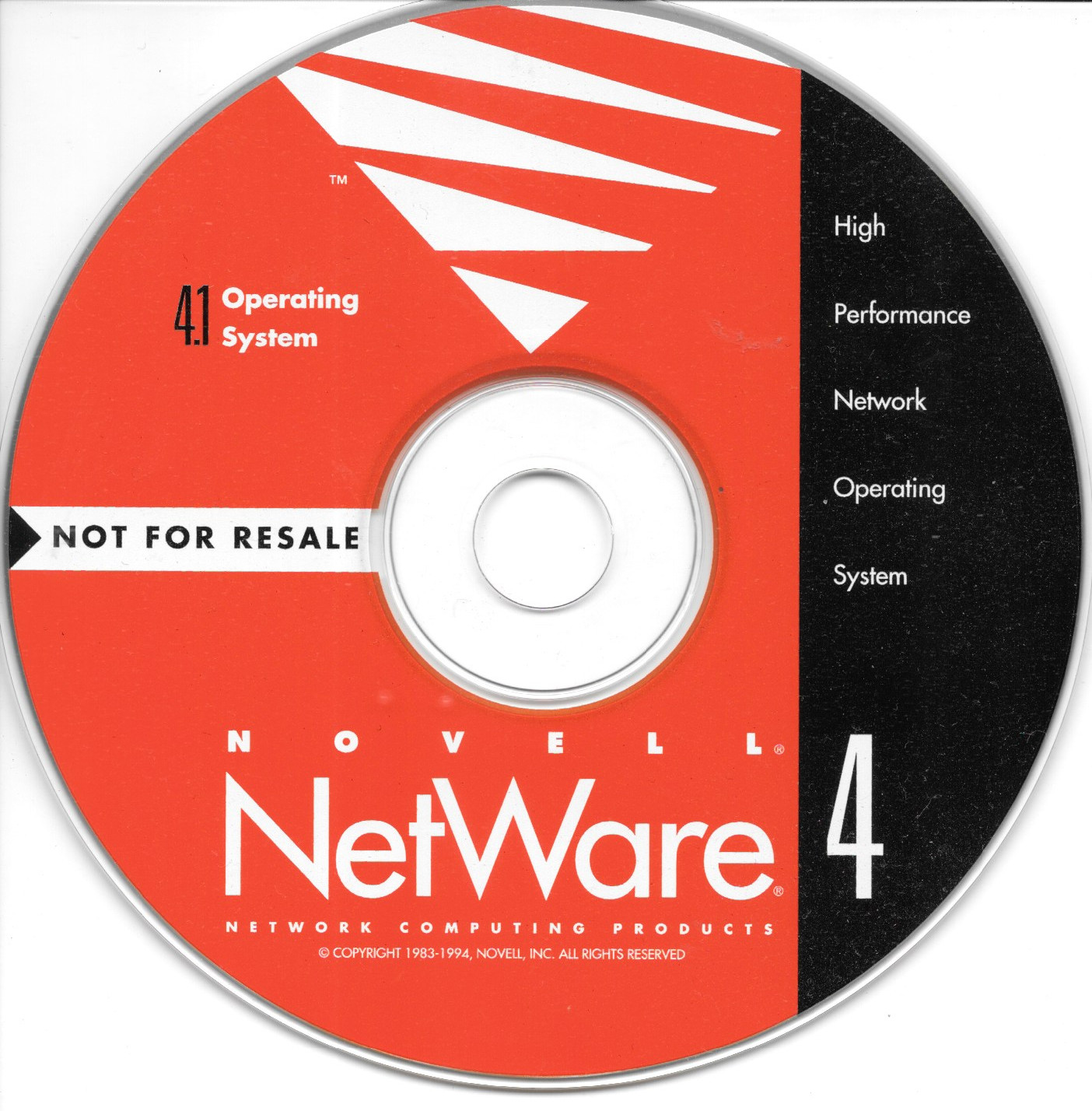
I also took a night class in a local high school to learn it. Netware was very popular in business’s at the time. Because of the Internet I could do research on the Internet and quickly learned that the majority of Internet servers ran some type of Unix and TCP/IP for connecting WANS. Another thing I wanted to learn was HTML, but I was a MS-Windows user and the best way to learn all this the Microsoft way, was to use their server OS which was at the time, Windows NT. Apache at the time seemed to be the prevailing Internet way to serve HTML. To legally use Microsoft software on multiple machines you needed to purchase a copy or license for each machine. This was starting to look like an expensive proposition for one guy in the privacy of his home. Never mind the fact that if I, as a computer administrator had been able to legally play with their server OS I might have been more likely to recommended it. But I wasn’t…I was treated like any other company with big pockets and expected to buy it. So in September of 1994 came my first exposure to Unix, I spent $161.90 for Coherent Version 4.2.10 (a Unix clone). Below is the cover of the thick, 1200+ page manual, that came with my purchase
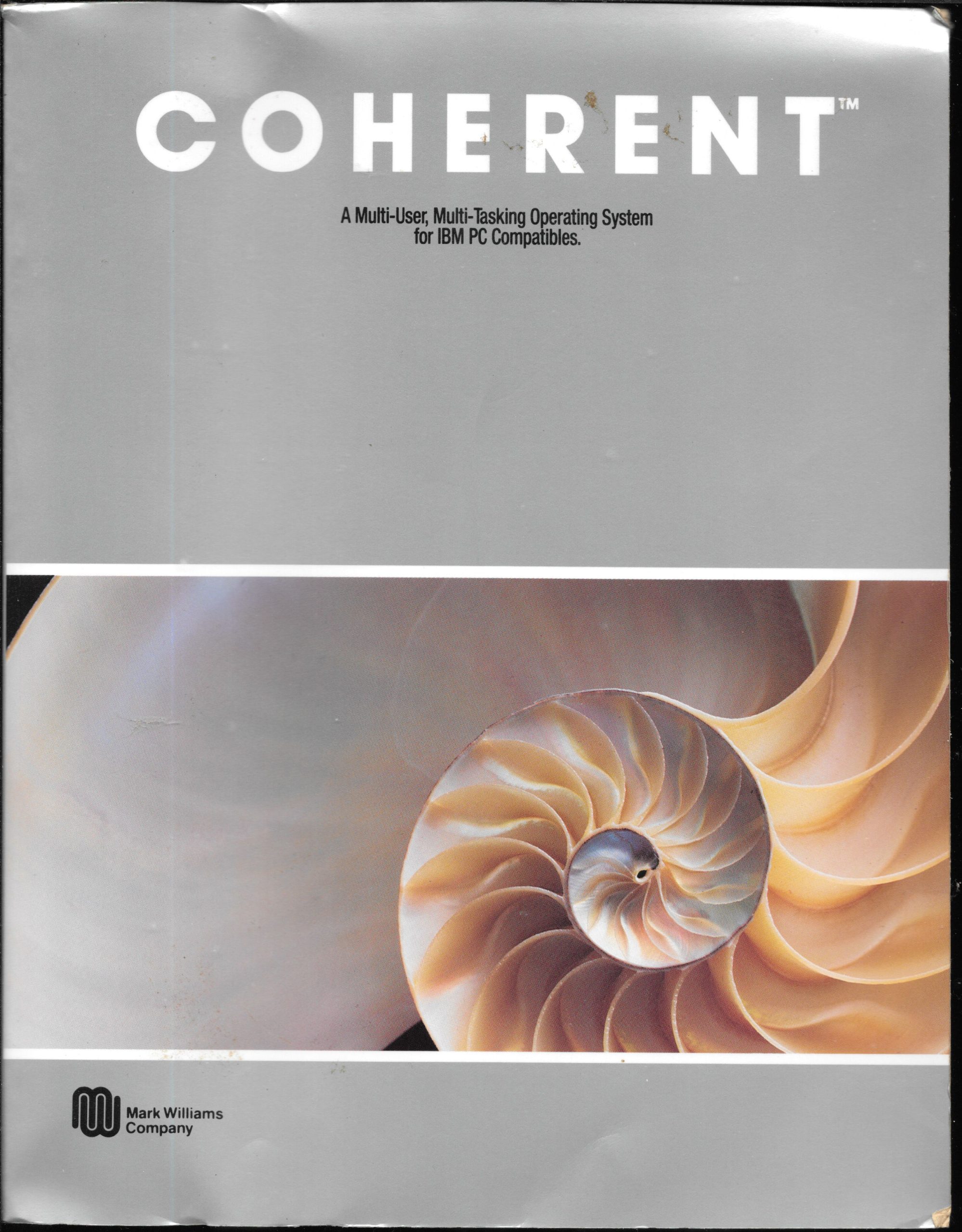
The base system came on 4, 3.5 inch floppies. X-Windows V1.1 came on 2 floppies, and a X Gamepack on one floppy. I don’t think I ever tried to get X working.
Shortly after that I heard about Linux. I actually think I first heard about Linux from the Novell administrator, at the bank where I worked. Slackware 3.0 was the 1st was the first Linux distribution I used/installed. My subscription to the Linux Journal started with issue #9 (January 1995) so my interest started a little before I actually used it. Here’s the book (over 1.100 pages), that the CD came with. This book has a 1996 copyright.
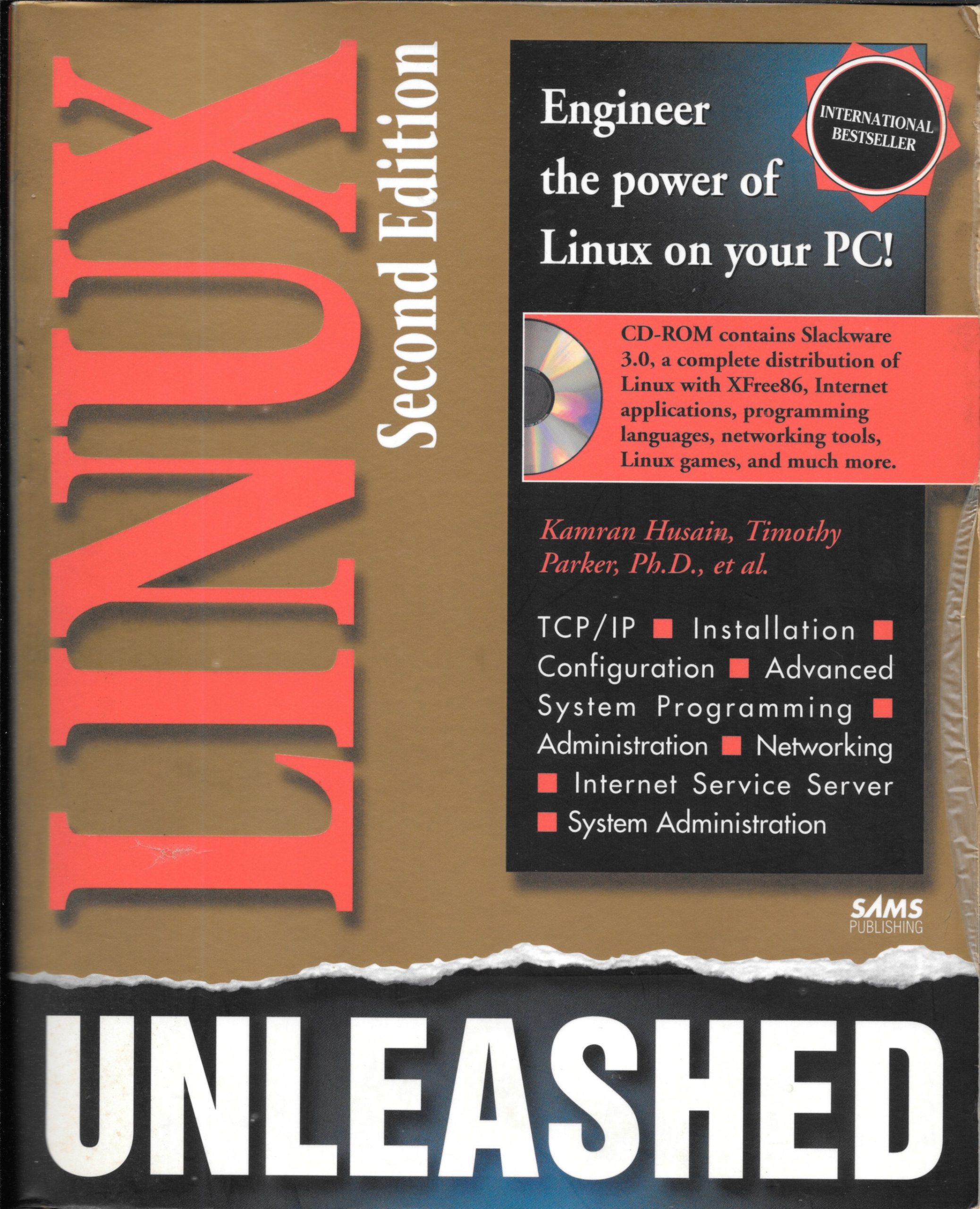
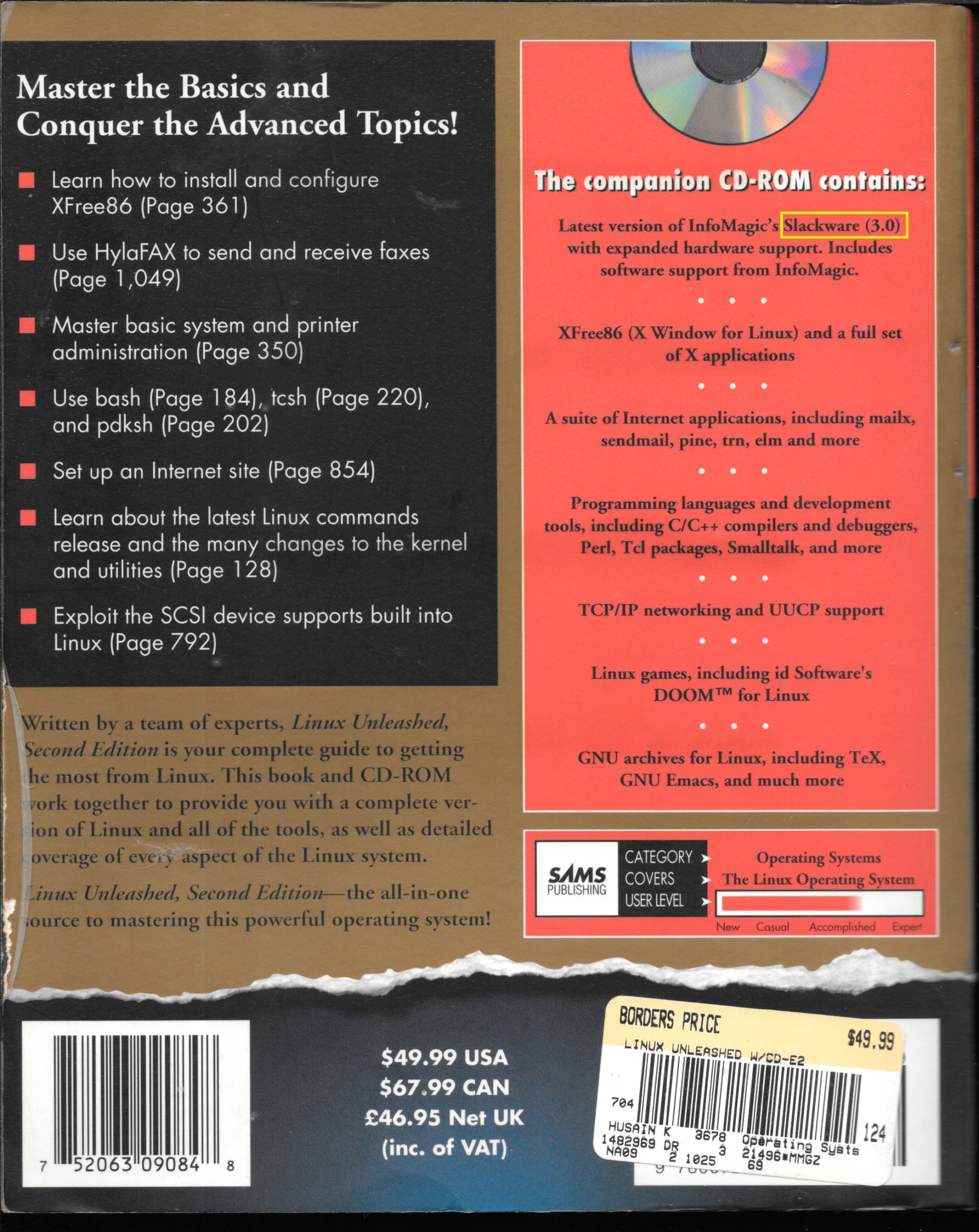
I even got the X windows environment working, back then you needed to have your graphics card and monitor manual in hand to setup config files or you could easily fry your monitor (so it was said) if you set something wrong. But for me X (at that time) wasn’t a suitable productive replacement for MS-Windows. Still there was much you could do at the command prompt.
If I waited for the best Linux… Arch (I’m being sarcastic, if you can’t tell), as many people like to say, I’d have to wait another 6 years, because Arch was 1st released in March 2002. This superior, Linux had the advantage of 6 more years of Linux (kernel & utilities) advancements., from when I started. They’re so annoying with their attitude. BTW…I use Arch!
BTW… I don’t give a S#!t.
I used Red Hat [V4.1] before Fedora existed (also before Arch existed). Copyright 1997.
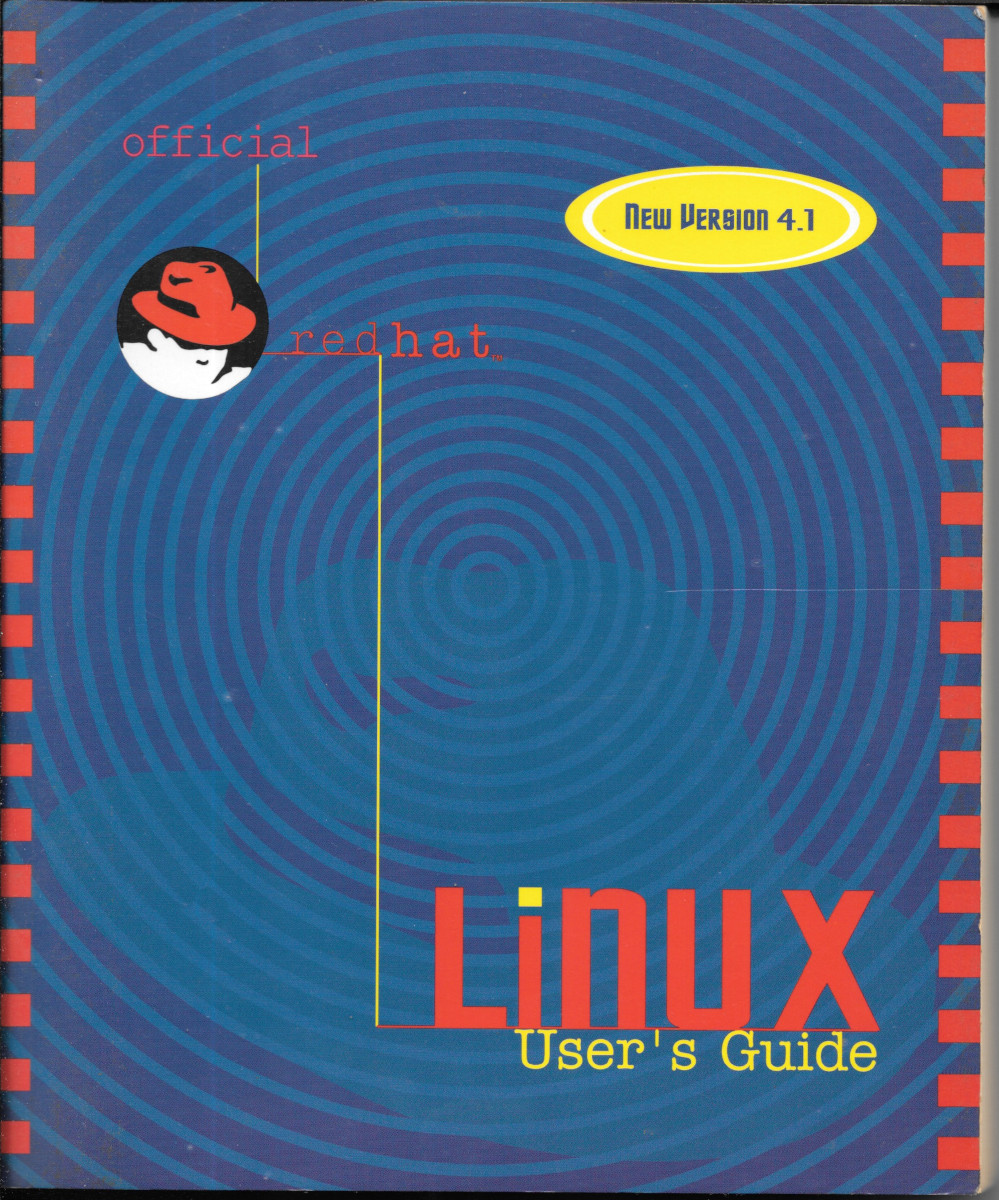
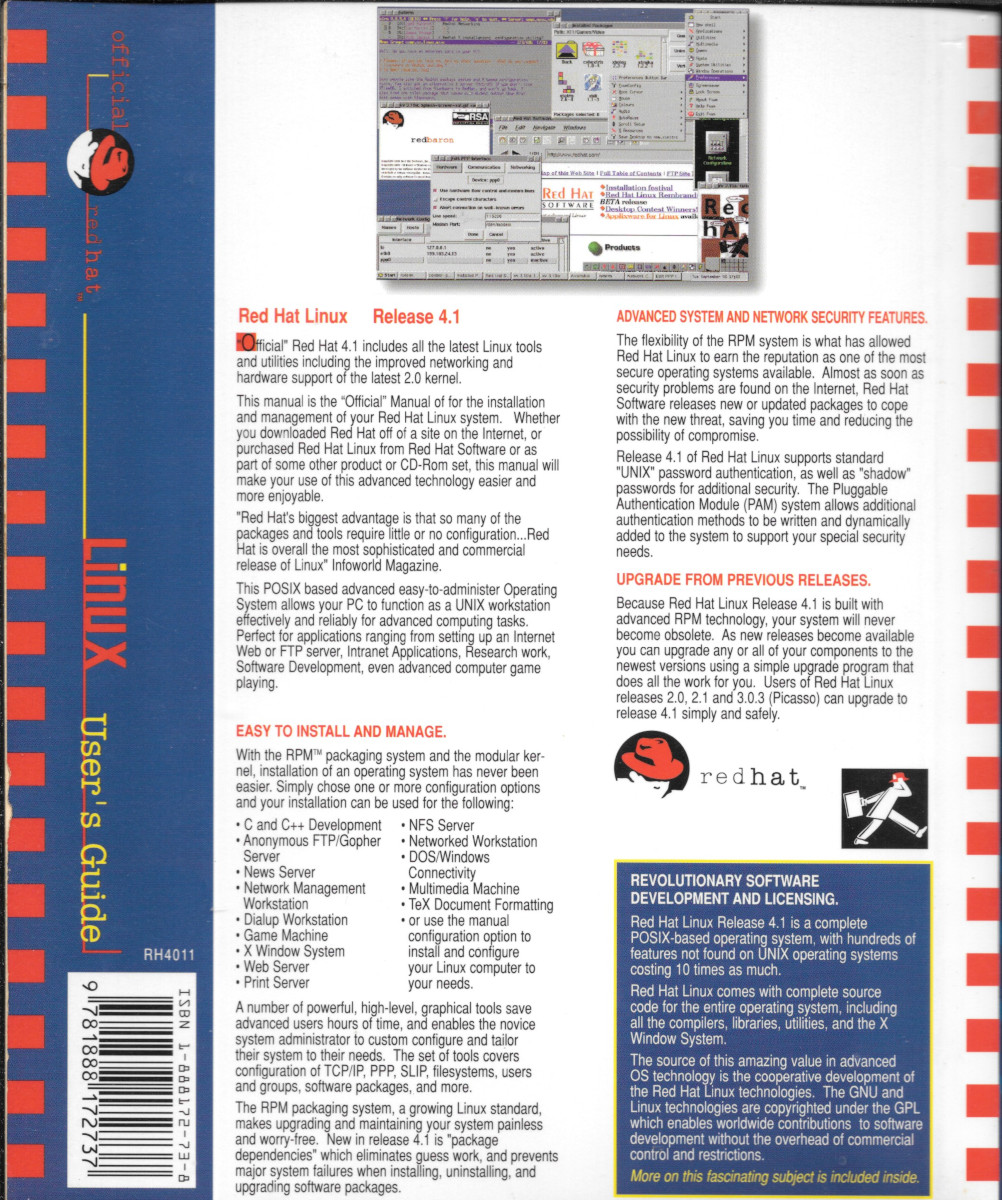
and Suse 6.1, before OpenSuse existed (also before Arch existed). The book says copyright by SuSE GmbH, but no date is given. However their archive, says SuSE Linux 6.1 was released on Wednesday, April 7, 1999
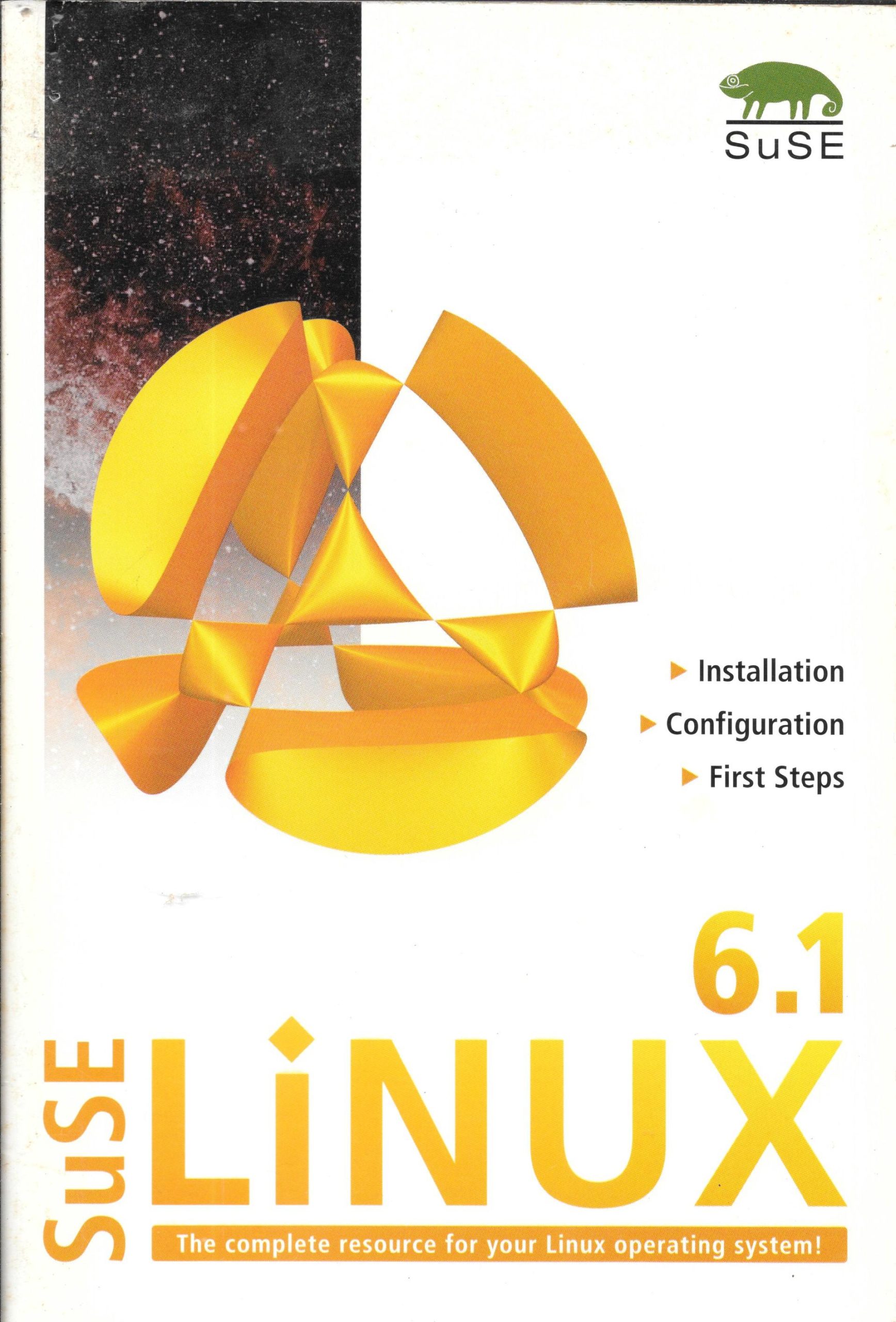
So my initial reasons for turning to Linux unlike many people, was more political and against Microsoft itself and not because I thought Windows sucked. I didn’t like being treated like a pirate. Forced to enter product keys. If my hardware changed too much I didn’t want to grovel, beg and explain to them why their software thought I was a dirty thief, so they could decide if they would accept my explanation, and would bless and allow me the privilege of using their software. I never used terms like Micro$haft or Winblows.
Back then my primary way of distro hopping was to order CD’s by snail mail from companies because dial up internet was too slow. Walnut Creek comes to mind, but mostly for me linuxcd.org. Ubuntu 6.06 LTS was released in 2006.
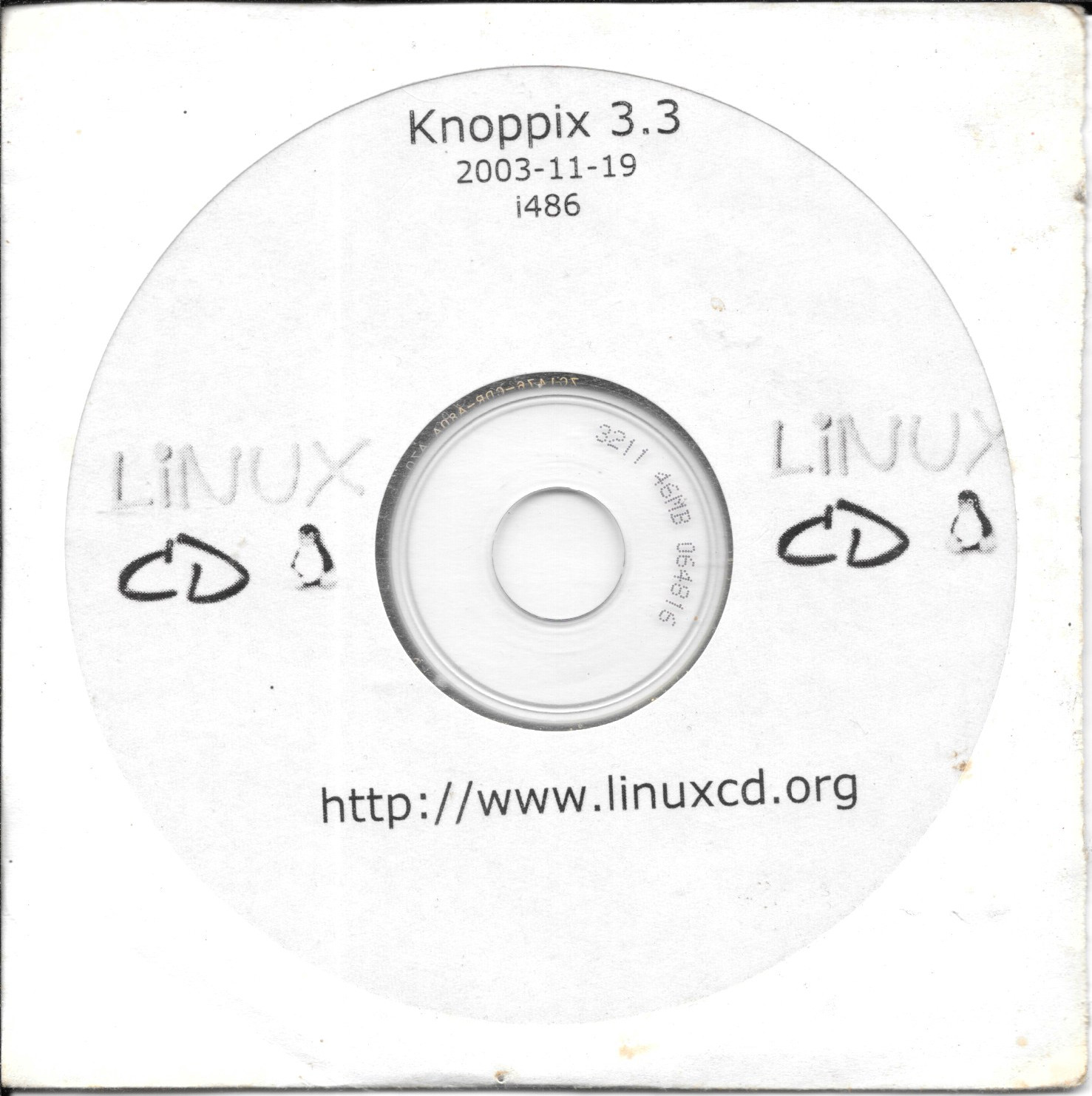

I couldn’t tie up a phone line downloading software, that I also needed for phone use for many many hours or days.
Some of the below dates are off a little with the above dates, so I’ll have to look into it. Because I’m a stickler for correct dates.
Later around 1998-1999 I bought for $30 at CompUSA, a boxed shrink wrapped copy of Suse Linux 6.1, and begin to see the potential toward an actual usable replacement of MS-Windows.
In Feb. 1998 I set it up at a bank I was working at. I worked on most solutions on my home network, then applied it at work. I used it as a Web, MySQL, DHCP and DNS server. I handled the TCP/IP setup at our bank and attached it to our network. I also set up MRTG (running on Linux) to monitor CISCO routers (including those at remote branches) that I was responsible for at the time to produce some very nice (almost real-time) graphs of their status. I even wrote some simple perl programs to access a MySQL database to display an address book via a browser. Many years ago I mostly used the PHP/MySQL combination for web stuff. Today I really don’t do much web stuff.
For my daily work I exclusively use Linux. A long time go I also used Windows 2000 (via dual boot). Although, thanks to VirtualBox VM manager, I stopped dual booting very quickly. I needed…for a time, Windows to run MS-Access for some local contracting jobs.
I have also used Knoppix, Damn Small Linux (Yes, that’s it’s name), Ubuntu , Kubuntu, Xubuntu, Bodhi, Vector Linux, Manjaro, Puppy, SolydX and probably some others I can’t think of. I, along with my 3 kids, used Fedora 5 for many years as my primary OS, my computer was so old and slow (1st a 1.2 Ghz AMD then a Dell with less than 800 Mhz Intel CPU and less than 500 MB memory) that I was afraid to upgrade.
Today I mostly use what many Linux users like to call a Linux for beginners or noobs…Linux Mint. When I first started using Linux it seemed enough to proclaim your superior computer knowledge by simply distancing yourself from regular Windows users. Although I personally never felt the need to do that. Today with so many people knowing about or at least hearing about Linux that is no longer enough. Now it seems necessary to show your superiority over regular Linux users by proclaiming your Linux better (often meaning harder to install) than theirs…”not only am I more advanced than Windows users but also most Linux users!”
Many people say Linux Mint is for beginners and I might also add for people like me who want to concentrate on learning other things. I get the impression that the main reason Arch or Gentoo users use those distros because everything is harder. I guess the Linux from Scratch people get to denigrate the Arch and Gentoo people. Where does it end? With Linus Torvalds? Will someone come along and write Linux in Assembler and call Linus a noob because Assembler is harder than C? Even though C is a better tool for the job.
I don’t primarily use Linux to learn Linux…although in the early days that was certainly fun too. I use it as a means to an end…a tool. In my case why spend a lot of time learning the details of something I’m not likely to use again anytime soon. Besides my memory is bad so I’d probably forget it anyway by the time I really needed it. So I might as well just wait till that time. For example why should I become an expert in VI or EMACS? Something I have no intention of using day to day. I know enough VI and have my personal cheat sheets that I can edit config files with it in a pinch…if necessary. Also…today there’s a good chance nano, a much easier and intuitive command line editor is available. A few years ago if you screwed up your computer you might need another computer or friend with a computer to diagnose problem(s). But today most people have another computer, usually on them…their phone!
I want to concentrate on learning a new language. Or perhaps work on my photo editing skills with Gimp. Maybe dive more into video editing with Kdenlive.
Maybe play with computer simulation/emulation running IBM mainframe software that powered huge companies and the government…back in the day. This alone depending on far you want to take it could take many many years. People spent their whole careers working then retired in this environment.
How about flying a Cessna 172 or Boeing 747 with X-Plane 11. Because simulation has advanced so far and computers have become so powerful…this alone also could be something you could spend a very long time with. Actually learning the principals of flight and operating the controls that behave very much like the actual controls. Learning to fly by visual flight rules (VFR) or instrument flight rules (IFR). Tech people should love aviation, they have almost as many acronyms as the computer field. This will allow you to casually drop those acronyms into conversations with people. Then exclaim “you mean you don’t know what a VOR is?”…you illiterate simpleton. The depth that you can go to is huge and you can spend a lot of time learning.
I was recently listening to a Linux podcast where everyone was explaining what superior computer skills they had over Windows users. They would frequently say things like 95% [95% seems like a popular number to quote] of Windows users could not figure out this or that. Where did this 95% come from? An official study? More than likely saying 95% don’t understand allows you to self proclaim your intelligence as the among the rare 5% that does understand. Well actually I’d probably agree that most Windows users would have a hard time with Linux. However that’s mainly because 95% of Windows users see no reason and/or have no desire to change. I’d say if a Windows user heard of and was interested in learning Linux then a much higher majority than 5% would succeed.
Add to that, all the information available today to learn Linux. There are countless (almost literally) forums and tutorials including YouTube videos available to hold your hand on any topic. You can’t underestimate Google and YouTube for learning. Neither one existed when I got into Linux. You know how many YouTube videos there are for installing Arch? I don’t, YouTube doesn’t give a count…but there are a lot. You know how many YouTube videos there were when I installed Slackware? Zero! Have you ever heard of dependency hell? Get over yourselves Arch users. Google started in 1998 and YouTube in 2005…according to Wikipedia. Try installing Linux when it was very young and not nearly as stable and only a fraction of information available today was available then. Try installing when maybe your only help was the man pages. RTF man page…what fun!
Perhaps I’d more interested in deep diving into Linux if I hadn’t already done this as my career. It was my job to keep mini (DEC) and mainframe (IBM) computers running properly…applying patches and supporting programmers. Often I’d come in at 2AM on a Sunday morning to install/test new software or the Operating System and be prepared to roll back if there was a problem…trying my best NOT to negatively impact our customers, and only doing this only AFTER testing in a virtual environment during business hours. IBM had VM (Virtual Machine) way before Linux existed. Been there…done that.
Having said all this, in all honesty I don’t think of myself as a great Linux guru. I learn what I need to accomplish what I want then probably forget most of that. There is no great need to memorize all the details. I have the Internet for that. Much like a auto mechanic doesn’t need to memorize all the details of every car to prove his abilities. There are manuals and also the Internet.
Anyway that’s this noobs Linux story.